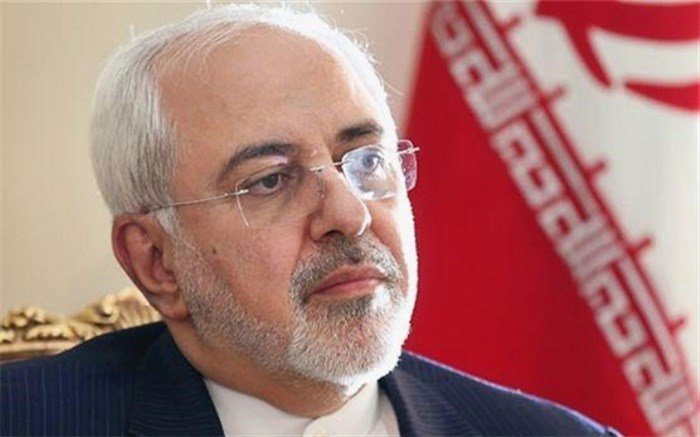Zarif dismisses U.S. talks offer, says U.S. broke nuclear deal

TEHRAN- On Thursday, Iranian Foreign Minister Mohammad Javad Zarif hit back at a U.S. offer of negotiations, saying the United States had violated the terms of the 2015 nuclear accord.
In May, President Donald Trump pulled the U.S. out of that nuclear accord - which put limits on Iran’s nuclear work in return for termination of financial and economic sanctions.
The U.S. special envoy for Iran, Brian Hook, said on Wednesday that the U.S. now wanted to negotiate a “treaty” that included Tehran’s ballistic missile program and its regional role.
According to Reuters, Hook said the new deal that Washington hoped to sign with Iran, would not be a “personal agreement between two governments like the last one, we seek a treaty.”
FM Zarif dismisses characterization of nuclear deal as ‘personal agreement”, says it is “an int’l accord enshrined in a UN Security Council resolution.
Zarif took to Twitter to dismiss the characterization of last deal as a “personal agreement”, saying it was “an int’l accord enshrined in a UN (Security Council resolution)”.
“U.S. has violated its treaty obligations too... Apparently, U.S. only mocks calls for peace,” Zarif added.
The European Union and the five other world powers that signed the 2015 accord with Iran - France, Germany, Britain, China and Russia - have been trying to keep the agreement alive.
In his speech before the conservative Hudson Institute, Hook reiterated that “sanctions” is the Trump administration’s only policy on Iran.
The Trump administration has said that it is willing to talk to Iran, a gesture deemed as inauthentic by Tehran).
“I suspect the Iranians are going to try and wait out the Trump administration,” said Micheal Elleman, senior fellow for Missile Defense at the International Institute for Strategic Studies.
The threat of Iran’s ballistic missiles, he said, is “more of a straw man — everyone is scared of missiles… but I don’t know what the administration is offering. I’ve heard nothing new from Hook this morning.”
The current sanctions approach fails to address Iran’s security concerns — its neighbors, Iraq and Afghanistan, are occupied by U.S. forces, and nearby Persian Gulf Arab countries host U.S. military bases.
“I just don’t see where this more aggressive strategy is headed. If I’m Iran, I look at it as a prelude to regime change.”
Hook repeated Trump’s rhetoric, blaming Iran for everything that is going wrong in the Middle East — from Iraq, which the U.S. invaded in 2003, to Yemen, where the U.S. is supporting the Saudi Arabia-led campaign that has led to the slaughter of thousands of civilians.
He described essentially all of Iran’s weapons capabilities as a threat — short-range missiles and long-range missiles alike. But even Iran has said that it doesn’t need all of those weapons.
“Iran said it doesn’t need missiles that fly beyond 2,000 km [1242 miles]… Let’s take up on that offer and create an agreement that’s verifiable that prevents Iran from developing ‘ICBM’s [Intercontinental Ballistic Missiles], which Hook kept talking about, which I don’t know what evidence he has that they’re even developing,” said Elleman, according to thinkprogress.
Missiles, though, play a big part in Iran’s “defense and deterrence” strategy, he said.
It’s worth noting that Iran has been found to be in full compliance with the terms of the 2015 nuclear deal — the Joint Comprehensive Plan of Action — which has seen Iran subjected to repeated inspections by the UN nuclear watchdog agency in exchange for sanctions relief.
As is often the case in these sorts of events, the audience — including the press — had to submit written questions, which were vetted by the moderator before being issued to Hook.
Somehow, no one had any critical questions.
The sole voice of dissent belonged to CodePink, who managed to get on stage after Hook’s speech and before the Q&A, to accuse Hook of “making the case for war with Iran.”
U.S. sanctions do not enjoy the support of the Iranian people living inside the country. However, the Trump administration has reached out to a select diaspora, including the former terrorist group MEK, which is wildly unpopular among Iranians, and others sympathetic to their perspective, such as the individuals invited to Secretary Pompeo’s speech in July (members of media, from whom Pompeo did not take questions on the record, notwithstanding).
The former director of policy planning, Hook first started work on Iran during George W. Bush’s second term in office in 2006. He was adviser to then UN Ambassador (now National Security Adviser) John Bolton, who has advocated for bombing Iran and was a vocal critic of 2015 nuclear deal.
Trump has threatened other countries, including other parties to the JCPOA, with sanctions should they do business in Iran or purchase Iranian oil after the oil sanctions hit in November.
Other sanctions on Iran have already been re-imposed.
All of the other countries in the deal support the agreement and are trying to find a means of staying in it and protecting their companies from U.S. sanctions.
“I can’t imagine why the Iranians would come to the table and trust the United States at this point,” said Elleman, a former weapons inspector who worked in Iraq. “I think getting out of the JCPOA will go down as one of the greatest unforced blunders outside of the Iraq invasion in the last 25 years.”
PA/PA
Leave a Comment